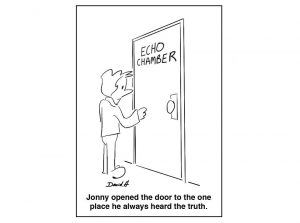I submit that the answer to the question … “How can the negative power of echo chambers be mitigated”? starts with what I have asserted from the beginning of this series of posts.
The most significant human trait that sustains and encourages the proliferation of and participation in harmful echo chambers is our unwillingness to entertain the possibility that we may be wrong.
The idea that we can mitigate the power of echo chambers by embracing our fallibility is counterintuitive. The very reason we reside in echo chambers is because of our desire for confirmation that we are right. Kathryn Schultz is helpful in understanding the importance of error.
Far from being a sign of intellectual inferiority , the capacity to err is crucial to human cognition . Far from being a moral flaw , it is inextricable from some of our most humane and honorable qualities : empathy , optimism , imagination , conviction , and courage . And far from being a mark of indifference or intolerance , wrongness is a vital part of how we learn and change . Thanks to error , we can revise our understanding of ourselves and amend our ideas about the world .
Schulz, Kathryn. Being Wrong: Adventures in the Margin of Error (p. 5). HarperCollins. Kindle Edition.
While we intellectually accept that we may be wrong, to consistently adopt that frame of mind is a daunting task. As we have seen, the desire to protect our rightness rejects any notion that we may be wrong. At the same time, accepting our fallibility is the only effective antidote to the irrational notion that we are infallible.
There is a deep aversion to being wrong. It feels wrong and counterintuitive to look for evidence that contradicts our rightness.
If we relish being right and regard it as our natural state , you can imagine how we feel about being wrong. Quite unlike the gleeful little rush of being right—we experience our errors as deflating and embarrassing. In our collective imagination , error is associated not just with shame and stupidity but also with ignorance , indolence , psychopathology , and moral degeneracy . (Shultz)
I have observed in my personal interactions, most likely because of writing this article, a correlation between interpersonal conflict and perceived implications of wrongness. Even in ordinary conversations about the most mundane subjects, an innocent remark perceived as a challenge to my rightness can initiate s defensive reaction, if not conflict. The need to defend my position transcends any possibility that I might be wrong. Too often that results in, at worst, anger, resentment, disrespect and/or verbal abuse. At a minimum, an opportunity to communicate effectively and gain better understanding of the other person’s beliefs has been squandered.
It is naive to think that just knowing we need to acknowledge our fallibility will enable us to do so.
.. a widely discussed study found in the last decade that political partisans, when presented with contravening facts, leads to a hardening of the original position. Brendan Nyhan, summarized: “the general idea is that it’s absolutely threatening to admit you’re wrong.” “Cognitive dissonance”—the “backfire” which we experience when we encounter some reality that stands in tension with our presumptions—is painful. So, digging in our heels, when faced with contrary facts, is a natural defense mechanism to avoid that cognitive dissonance.”
?
If facts don’t necessarily have the power to change our minds and more education is not a solution, we are faced with the discomforting reality that any solution must come from within ourselves.
The major threats to our survival no longer stem from nature without but from our own human nature within. It is our carelessness, our hostilities, our selfishness and pride and willful ignorance that endanger the world.
Unless we can now tame and transmute the potential for evil in the human soul, we shall be lost. How can we do this unless we are willing to look at our own evil?
Evil can be defeated by goodness. When we translate this we realized what we dimly have always known: evil can be conquered only by love.
The first task of love is self purification.
People the Lie M. Scott Peck“Nothing will make us so charitable and tender to the faults of others, as, by self-examination, thoroughly to know our own.” ~ Francois Fenelon
